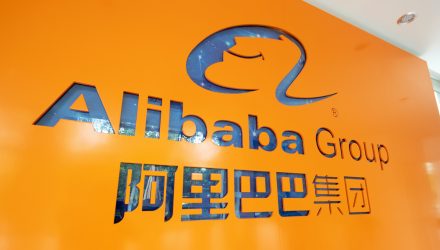While China said Friday that it could not establish a target for economic growth this year based on the widespread uncertainty the coronavirus pandemic has caused to the world’s second-largest economy, Alibaba Group Holding Co. posted stronger-than-anticipated fourth-quarter earnings Friday, as China’s prolonged quarantine aided online sales for Asia’s most valuable tech company.
Alibaba said diluted non-GAAP earnings for the quarter finishing in March, the company’s fiscal third quarter, were $1.30 per share, besting Wall Street’s estimate of roughly 86 cents per share. Group revenues, Alibaba said, climbed 22% from last year to $16.144 billion, once again exceeding analysts’ estimates of a $15.28 billion target. Cloud computing revenues increased 58% to a record of $1.725 billion also, the tech giant said.
Looking into the 2021 financial year, Alibaba predicts revenues will reach roughly 650 billion Chinese yuan ($91 billion).
“Our overall business continued to experience strong growth, with a total annual active consumer base of 960 million globally, despite concluding the fiscal year with a quarter impacted by the economic effects of the COVID-19 pandemic,” said CEO Daniel Zhang. “The pandemic has fundamentally altered consumer behavior and enterprise operations, making digital adoption and transformation a necessity.”
We are well-positioned and prepared to help large and small businesses across a wide spectrum of industries achieve the digital transformation they need to survive this difficult period and eventually prevail in the new normal,” he added. “By focusing on the long term and investing in value creation for our consumers and business customers, we believe we will emerge from this crisis stronger and be ready to capture more growth in the future.”
Despite beating analyst expectation however, Alibaba’s U.S.-listed shares shed over 5% in trading on Friday, in part likely due to news that China was unable to establish a GDP number for this year.
“I would like to emphasize that we have not set a specific target for economic growth this year,” said Chinese Premier Li Keqiang in his annual policy address at the National People’s Congress session on Friday in Beijing.
China has been setting growth targets for decades, making this development particularly unsettling. Last year, the country projected growth between 6% and 6.5%. GDP grew 6.1%, within range, but its slowest pace in nearly 30 years.
Investors looking at allocating a portion of their portfolios to BABA can explore the Invesco BLDRS Emerging Markets 50 ADR Index Fund (ADRE), the iShares MSCI China ETF (MCHI), or the ProShares Online Retail ETF (ONLN).
For more market trends, visit ETF Trends.
